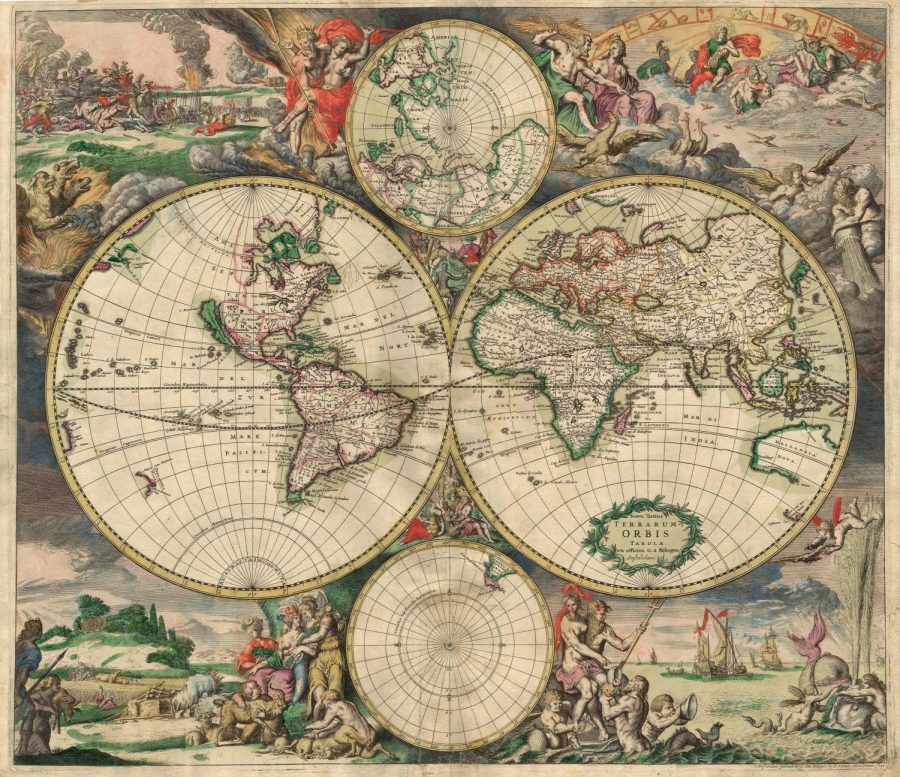Trade, Conquest, and Diplomacy: How it Can Exchange Cultures
February 12, 2020
Empires rise and empires fall, but culture has spread through these empires through contact and trade. Sometimes, culture can clash and merge. Sometimes they exchange tidbits which can affect each other in surprising ways. Trade and diplomacy can create cultural exchanges and other technological benefits.
For example, we only need to look at the Islamic Empire that reigned for centuries. During the early stages of the Islamic Empire, The Umayyads expanded their Empire greatly from as far west as Morocco to as far east as modern-day Pakistan. War, diplomacy, and trade dominated their expansion doctrine. Britannica says that, by expanding towards Africa, long-distance trade to Western Africa opened up. With money flowing into the Sudanic Kingdoms, their leaders converted to Islam to appease the Umayyads. They built mosques and followed the Pillars of Islam, but they altered some parts of traditional Islamic beliefs and architecture. For example, according to Sacred Destinations, they built their mosques out of mud bricks and clay with their own personal twist, unlike the stone and traditionally Arabic mosques in the Middle East. Furthermore, Wikipedia details how the Swahili language was born when Bantu borrowed some Arabic words in Eastern Africa. This then became the lingua franca in East Africa due to lucrative trade with the Middle East. The Islamic Empire also traded with China along the Silk Road, trading silk, books, and medicine. The Silk Road became such an important segment of the Middle East that when the Byzantine Empire fell to the Muslim Turks, Europe started the Age of Discovery to bypass the Islamic Empire when they refused to trade with Christian Europe. The Islamic Empire and the Silk Road made great technological, scientific, and cultural impacts all over the world and we can see that today in parts of Africa, East Asia, and Europe.
Winding the clock by a few hundred years, the Roman Empire stood at its height in 117 CE and conquered the entire Mederterrian Sea. Wikipedia says that, after the sacking of Rome and the Empire’s collapse in 476 CE, roads and great works like the aqueducts became in disrepair. But due to the Empire’s massive size, it’s language and legacy was ingrained in Europe. The German word “Kaiser” meant emperor, but both also reference “Caesar” or “Imperator,”the title of Roman Emperors. Latin also saw a resurgence in science and used as roots for some languages. For example, English uses Latin prefixes and such. According to Infoplease, “co”, “inter”, and “re” are all Latin and used in English words like coworker, intermarriage, and reshoot. This legacy is also in art and building. The Romans copied the Greek architecture of great marble pillars and spread it across the Mediterranean Sea and soon spread all over the world. If you look at modern-day Washington D.C., government buildings share the same type of architecture, most notably Congress, the Supreme Court, and the White House.
The fall of the Roman Empire allowed for a certain set of islands to rise up to become the largest empire in the world. “The sun never sets on the British Empire.” A motto that stood true during the height of the Victorian Era. Spanning from the Americas to as far as India, the British Empire ruled until the 1950s. History.com says that, during the Opium Wars (1839 – 1860), the Qing Dynasty seated the port of Hong Kong to the British Empire until 1997, when Britain returned Hong Kong to China. The British had a major influence over Hong Kong, though, according to Just Landed. Today, people still use British slang, speak English (along with Cantonese or Mandarin), and they even have British-styled tea houses. Another contribution of the British Empire was the spread of language and religion. Christianity and English spread throughout the world by the colonies of the British Empire. You can tell where the British Empire has and have not been just by looking at the language or religious demographics of the world.
However, China held a tea monopoly before its diplomatic ties with Britain and the Opium Wars. That led to tea cultures developing in China for hundreds of years. People used to make “tea art” with complicated pictures and there’s even a legend about how tea was discovered. Korea and Japan have also developed their own tea culture, with the Japanese tea rituals and the Korean tea ceremony (Darye) being dominant during the time. Tea has diffused worldwide and most countries have their own unique tea cultures and ceremonies, especially in eastern Asia where it originated from.
We have seen the impacts of some empires of the world, from the Islamic Empire in the Middle East to the British Empire where the sun never sets. Through influences, culture can change. Religion and faith can also make a lasting impact on our culture but also our morals, laws, and traditions. Culture, however, has been greatly impacted by empires. Their legacies may not be in glory or conquest, but in culture, arts, and sciences. From the Columbian Exchange to Silk Road, culture can be affected by contact with different people, their arts, or maybe even a leaf drink.






























































































































